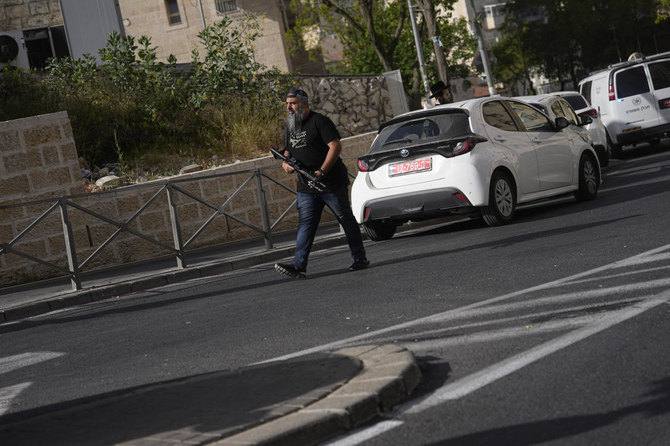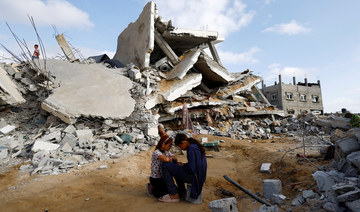Jerusalem: Two civilians were injured in a car ramming attack in Jerusalem on Monday morning, the Israeli police said, adding that they were searching for suspected assailants who fled on foot.
The incident occurred on Techelet Mordechai street in Jerusalem on a day when Israeli Jews marked the start of the Passover holidays.
“A short time ago, a report was received that two civilians had been run over on Techelet Mordechai Street in Jerusalem, resulting in minor injuries,” the police said in a statement.
“Two terrorists fled the scene on foot and an improvised weapon... was found on their escape route,” it said, adding security forces were searching for the suspects.
Medics from the Magen David Adom emergency service said the two injured were aged 18 and 22.
Footage from security cameras posted on several Israeli news websites showed a white car ramming into a group of people at a street corner.
The car later hits another parked vehicle after which two men step out, with one of the assailants seen attempting to fire a gun.
Seconds later, the two are seen walking away from the site.
Several car ramming attacks have been reported since last year in a number of Israeli cities and in settlements in the occupied West Bank.
Two injured in Jerusalem car ramming attack: police
https://arab.news/6w76y
Two injured in Jerusalem car ramming attack: police

- incident occurred on Techelet Mordechai street in Jerusalem on a day when Israeli Jews marked the start of the Passover holidays
Rafah incursion would put hundreds of thousands of lives at risk, UN aid agency says

- Leaders internationally have urged Israeli Prime Minister Benjamin Netanyahu to be cautious
- US Defense Secretary Lloyd Austin said any US response to incursion would be up to President Biden
GAZA: The United Nations humanitarian aid agency says hundreds of thousands of people would be “at imminent risk of death” if Israel carries out a military assault in the southern Gaza city of Rafah.
The city has become critical for humanitarian aid and is highly concentrated with displaced Palestinians.
Leaders internationally have urged Israeli Prime Minister Benjamin Netanyahu to be cautious about any incursion into Rafah, where seven people — mostly children — were killed overnight in an Israeli airstrike.
On Thursday, US Defense Secretary Lloyd Austin said any US response to such an incursion would be up to President Joe Biden, but that currently, “conditions are not favorable to any kind of operation.”
Turkiye’s trade minister said Friday that its new trade ban on Israel was in response to “the deterioration and aggravation of the situation in Rafah.”
The Israel-Hamas war has driven around 80 percent of Gaza’s population of 2.3 million from their homes, caused vast destruction in several towns and cities, and pushed northern Gaza to the brink of famine.
The death toll in Gaza has soared to more than 34,500 people, according to local health officials, and the territory’s entire population has been driven into a humanitarian catastrophe.
The war began Oct. 7 when Hamas attacked southern Israel, abducting about 250 people and killing around 1,200, mostly civilians. Israel says militants still hold around 100 hostages and the remains of more than 30 others.
Dozens of people demonstrated Thursday night outside Israel’s military headquarters in Tel Aviv, demanding a deal to release the hostages. Meanwhile, Hamas said it would send a delegation to Cairo as soon as possible to keep working on ceasefire talks. A leaked truce proposal hints at compromises by both sides after months of talks languishing in a stalemate.
Across the US, tent encampments and demonstrations against the Israel-Hamas war have spread across university campuses.
More than 2,000 protesters have been arrested over the past two weeks as students rally against the war’s death toll and call for universities to separate themselves from any companies that are advancing Israel’s military efforts in Gaza.
Iraqi militant group claims missile attack on Tel Aviv targets, source says

- The attack was carried out with multiple Arqub-type cruise missiles
BAGHDAD: The Islamic Resistance in Iraq, a group of Iran-backed armed groups, launched multiple attacks on Israel using cruise missiles on Thursday, a source in the group said.
The source told Reuters the attack was carried out with multiple Arqub-type cruise missiles and targeted the Israeli city of Tel Aviv for the first time.
The Islamic Resistance in Iraq has claimed dozens of rockets and drone attacks on US forces in Iraq and Syria and on targets in Israel in the more than six months since the Israel-Hamas war erupted on Oct. 7.
Israel has not publicly commented on the attacks claimed by Iraqi armed groups.
15 pro-government Syrian fighters killed in Daesh attacks: monitor

- It is the latest attack of its kind by remnants of the jihadists
BEIRUT: Daesh group militants killed at least 15 Syrian pro-government fighters on Friday after they attacked three military positions in the Syrian desert, a war monitor said.
It is the latest attack of its kind by remnants of the jihadists.
They “attacked three military sites belonging to regime forces and fighters loyal to them... in the eastern Homs countryside, triggering armed clashes... and killing 15” pro-government fighters, the British-based Syrian Observatory for Human Rights said.
Daesh overran large swathes of Syria and Iraq in 2014, proclaiming a so-called caliphate and launching a reign of terror.
It was defeated territorially in Syria in 2019, but its remnants continue to carry out deadly attacks, particularly against pro-government forces and Kurdish-led fighters in the vast desert.
Daesh remnants are also active in neighboring Iraq.
Last month, Daesh fighters killed 28 Syrian soldiers and affiliated pro-government forces in two attacks on government-held areas of Syria, the Observatory said.
Many were members of the Quds Brigade, a group comprising Palestinian fighters that has received support from Damascus ally Moscow in recent years, according to the Observatory, which has a network of sources inside Syria.
In one of those attacks, the jihadists fired on a military bus in eastern Homs province, the Observatory said at the time.
Separately, six Syrian soldiers died in an Daesh attack against a base in eastern Syria, it added.
Syria’s war has claimed the lives of more than half a million people and displaced millions more since it erupted in March 2011 with Damascus’s brutal repression of anti-government protests.
It then pulled in foreign powers, militias and jihadists.
In late March, Daesh militants “executed” eight Syrian soldiers after an ambush, the monitor said at that time.
The jihadists also target people hunting desert truffles, a delicacy which can fetch high prices in the war-battered economy.
The Observatory in March said Daesh had killed at least 11 truffle hunters by detonating a bomb as their car passed in the desert of Raqqa province in northern Syria.
In separate unrest in the country, Syria’s defense ministry earlier on Friday said eight soldiers had been injured in Israeli air strikes near Damascus.
The Observatory said Israel had struck a government building in the Damascus countryside that has been used by Lebanon’s Iran-backed Hezbollah group since 2014.
The Israeli military has carried out hundreds of strikes in Syria since the outbreak of Syria’s civil war, mainly targeting army positions and Iran-backed fighters.
Prominent Gaza doctor killed by torture in Israeli detention

- Al-Bursh died in Ofer Prison, an Israeli-run incarceration facility in the West Bank, says the Palestinian Prisoners Society
GAZA: Adnan Al-Bursh, a Palestinian surgeon and former head of orthopedics at Gaza’s Al-Shifa medical complex, was killed on April 19 under torture in Israeli detention.
According to a statement from the Palestinian Prisoners Society, Al-Bursh, 50, died in Ofer Prison, an Israeli-run incarceration facility in the West Bank.
His body remains held by the Israeli authorities, according to the Palestinian Civil Affairs Committee.
The Palestinian Prisoners Society described the doctor’s death in Israeli custody as “assassination.”
Al-Bursh, who was a prominent surgeon in Gaza’s largest hospital Al-Shifa, was reportedly working at Al-Awada Hospital in the northern Gaza Strip when he was arrested by Israeli forces.
The Israeli prison service declared Al-Bursh dead on April 19, claiming the doctor was detained for “national security reasons.”
However, the prison’s statement did not provide details on the cause of death. A prison service spokesperson said the incident was being investigated.
Francesca Albanese, the UN special rapporteur on the occupied Palestinian territories, said on Thursday she was “extremely alarmed” at the death of the Palestinian surgeon.
“I urge the diplomatic community to intervene with concrete measures to protect Palestinians. No Palestinian is safe under Israel’s occupation today,” she wrote on X.
I am extremely alarmed by information that Dr. Adnan Albursh, a well-known surgeon at #alshifa_hospital, has died while detained by Israeli forces in the Ofer military prison. While I acquire more information, I URGE the diplomatic community to intervene with CONCRETE MEASURES to…
— Francesca Albanese, UN Special Rapporteur oPt (@FranceskAlbs) May 2, 2024
Since Oct. 7, when Israel launched its retaliatory bombing campaign in the Gaza Strip, the Israeli military has carried out over 435 attacks on healthcare facilities in the besieged Palestinian enclave, killing at least 484 medical staff, according to UN figures.
However, the health authority in Gaza said in a statement that Al-Bursh’s death has raised the number of healthcare workers killed in the ongoing onslaught on the strip to 496.
Palestinian prisoner organizations report that the Israeli army has detained more than 8,000 Palestinians from the West Bank alone since Oct. 7. Of those, 280 are women and at least 540 are children.
ICC prosecutor calls for end to intimidation of staff, statement says

- The ICC prosecutor’s office said all attempts to impede, intimidate or improperly influence its officials must cease immediately
- The statement followed Israeli and American criticism of the ICC’s investigation into alleged war crimes committed during the Israel-Hamas conflict in Gaza
AMSTERDAM: The International Criminal Court’s prosecutor’s office called on Friday for an end to what it called intimidation of its staff, saying such threats could constitute an offense against the world’s permanent war crimes court.
In the statement posted on social media platform X, the ICC prosecutor’s office said all attempts to impede, intimidate or improperly influence its officials must cease immediately. It added that the Rome Statute, which outlines the ICC’s structure and areas of jurisdiction, prohibits these actions.
The statement, which named no specific cases, followed Israeli and American criticism of the ICC’s investigation into alleged war crimes committed during the Israel-Hamas conflict in the Gaza Strip, a Palestinian enclave.
Neither Israel nor its main ally the US are members of the court, and do not recognize its jurisdiction over the Palestinian territories. The court can prosecute individuals for alleged war crimes, crimes against humanity and genocide.
Last week Israel voiced concern that the ICC could be preparing to issue arrest warrants for government officials on charges related to the conduct of its war against Hamas in Gaza.
Foreign Minister Israel Katz said Israel expected the ICC to “refrain from issuing arrest warrants against senior Israeli political and security officials,” adding: “We will not bow our heads or be deterred and will continue to fight.”
On Friday, Israeli Prime Minister Benjamin Netanyahu said any ICC decisions would not affect Israel’s actions but would set a dangerous precedent.
In October, ICC Chief Prosecutor Karim Khan said it had jurisdiction over any potential war crimes committed by Hamas fighters in Israel and by Israeli forces in Gaza, which has been ruled by Hamas since 2007.
A White House spokesperson said on Monday the ICC had no jurisdiction “in this situation, and we do not support its investigation.”






















